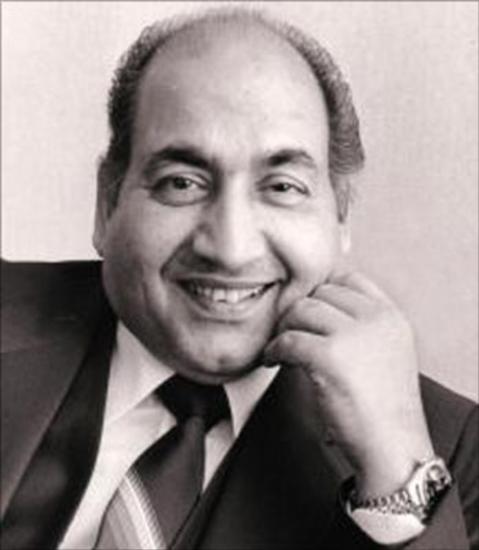


It's August time now. It must be - since 31st of July has fluttered off the calendar without much ado. Just another year, just another 31st of July. Who cares? Life goes on.
For me- it was on this date, years ago, an era ended. An era of greatness. An era of sweetness. On 31st July 1980 Mohd. Rafi- a genius among the singers - breathed his last.
This is a small tribute to one of the greatest singers of all time.
Mohd. Rafi was born on 24th December 1924 in Sultanpur Kotla - a small town in Punjab. Encouraged by Hamidbhai- a doting brother, Rafi started learning music under the tutelage of Ustad Wahid Khan. Kundanlal Saigal was Rafi's idol and following in his foot-steps Rafi soon established himself as a singer on radio and Punjabi films. Hamidbhai used to boast to the incredulous villagers that one day Rafi would even outshine Saigal.
In his bid to make his brother the toast of India, Hamidbhai brought him to Mumbai. Somehow this resourceful brother even managed to bring a recommendation letter from the leading composer Naushad's father. Naushad was impressed more by Rafi's voice- rather than the recommendation. In his film 'Pahele aap'(1944) - Naushad offered Rafi his first ever song in Hindi films. It was a marching group-song - Hindostaan ke hum hain, Hindostaan hamara hai. Thus began a journey into immortality.
In a career spanning more than 35 years, the name 'Mohd.Rafi' spelled magic for the composers, actors and listeners alike. His voice had an uncanny knack of portraying the exact emotion and expression the situation demanded. For him no song was too difficult. He could sing a classical number like Madhuban mein Radhika naache re, a bhajan like Sukh ke sab saathi, a romantic song like Khoya khoya chaand, a tear-jerker like Yaad na jaaye, a soulful ghazal like Koi saagar dilko bahalata nahin or even a rogue rock-and-roll song like Kiss..Kisko pyar karoon and he did it all with contemptuous ease.
Rafi would pick up the subtle nuances of the screen character and present them through his songs with such unerring precision that you could close your eyes and still identify whether it was Dilip Kumar, Shammi Kapoor, Rajendra Kumar or Johny Walker who was singing the song on the screen. When I was interviewing her, the one and only Lata Mangeshkar had gushed over this unparalleled range of Rafi's voice and had aptly described it as 'the gift of God'! How else can you describe such out of this world talent?
Till the advent of seventies Rafi was the undisputed numero uno of Hindi film music. The changing tastes and trends then relegated him to the second spot behind Kishore Kumar. It was a strange twist of the fate because in the past the same Kishore Kumar had employed Rafi's play-back voice for himself in songs like Man mora baawara (Ragini) and Ajab hai dastaan teri yeh zindagi (Shararat). Despite this setback Rafi continued delivering hits like Darde dil darde jigar, Parda hai parda and Kya hua tera vaada till the very end.
The last song sung by Rafi was in the film 'Aas paas'. The poignant lyrics of that song perfectly echo the sentiments of millions of music-lovers all over the world -
Tere milne ki aas hai dost
Shaam phir kyon udaas hai dost,
Maheki maheki fija yeh kaheti hai
Tu kahin aaspaas hai dost,
Tu kahin aaspaas hai dost!!
* (This article was written for Khaleej Times in 1998.)